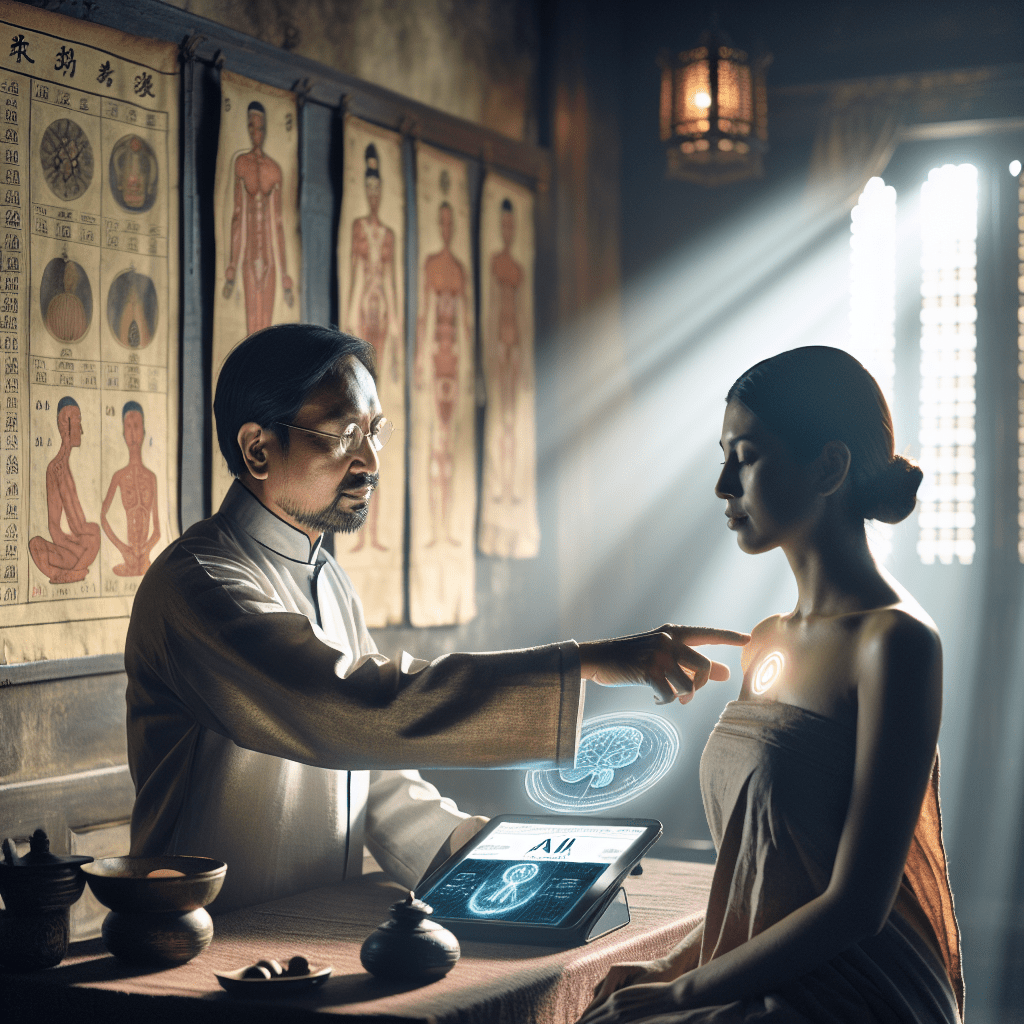Have you ever wondered what would happen if the ancient healing traditions of the East joined forces with cutting-edge artificial intelligence? It’s not just a fascinating thought experiment—it’s happening right now, and it could transform your approach to health and wellness forever.
Eastern medicine has stood the test of time for thousands of years, focusing on something truly revolutionary: treating you as a whole person, not just a collection of symptoms. Unlike the Western approach that often targets specific ailments in isolation, Eastern medical traditions like Traditional Chinese Medicine (TCM) and Ayurveda see your body as an interconnected system where balance is the key to wellness.
In TCM, this means harmonizing the flow of qi (vital energy) through meridian pathways and balancing the five elements of wood, fire, earth, metal, and water within your body. Ayurveda, India’s 5,000-year-old healing system, categorizes individuals into doshas (Vata, Pitta, and Kapha) and creates personalized treatment plans to maintain equilibrium between these constitutional types. These ancient approaches don’t just mask symptoms—they seek to restore harmony to your entire being.
But what happens when these time-honored practices meet the analytical power of artificial intelligence? That’s where things get really exciting.
The AI Revolution in Healthcare
Artificial intelligence is revolutionizing healthcare through advanced data analysis, pattern recognition, and predictive capabilities that complement and enhance traditional diagnostic approaches.
Artificial intelligence is reshaping healthcare in ways we could only dream about a decade ago. At its core, AI excels at what humans sometimes struggle with: processing vast amounts of data to identify patterns that might otherwise go unnoticed. In healthcare, this translates to powerful insights that can enhance diagnosis, treatment planning, and patient monitoring.
Machine learning algorithms can analyze thousands of medical images in minutes, often detecting subtle anomalies that human eyes might miss. Natural language processing can comb through millions of medical research papers to stay current with the latest findings. Predictive analytics can forecast health risks before symptoms appear, shifting the focus from treatment to prevention.
“AI is transforming healthcare from reactive to proactive,” notes Dr. Jennifer Liu, a digital health researcher. “Instead of waiting for people to get sick, we’re using algorithms to predict and prevent illness before it starts.”
The real magic happens when this technological powerhouse meets the holistic wisdom of Eastern medicine. While Eastern healing traditions have always excelled at personalization through careful practitioner observation, AI takes this individualization to unprecedented levels through data-driven insights.
Personalized Wellness Through Eastern Medicine AI
The fusion of AI technology with Eastern medicine creates unprecedented opportunities for truly personalized health plans tailored to your unique constitution and needs.
Eastern medicine has always recognized that no two people are exactly alike. Your constitutional type, life circumstances, and even the changing seasons all influence your optimal health strategy. AI now amplifies this personalized approach by processing thousands of data points about your unique health profile.
EASTCHI AI, for example, represents a groundbreaking fusion of Eastern medical wisdom with artificial intelligence. This innovative system doesn’t just collect standard health metrics like weight and blood pressure; it analyzes subtle patterns that Eastern medicine practitioners have been trained to observe for centuries—like tongue coating, pulse qualities, and constitutional imbalances.
Imagine taking a quick photo of your tongue with your smartphone, answering a few questions about your sleep and digestion, and receiving a comprehensive wellness plan based on your Five Element constitution type—all powered by algorithms that have learned from thousands of successful Eastern medicine treatments. That’s the promise of Eastern Medicine AI integration.
“What’s remarkable about combining AI with Eastern medicine is that we’re not replacing the wisdom of traditional practitioners—we’re amplifying it,” explains Mark Chen, a developer working at the intersection of traditional healing and technology. “The AI has studied more cases than any single practitioner could see in a lifetime, while still honoring the fundamental principles of Eastern healing traditions.”
The results speak for themselves. Users report feeling like their wellness plans were crafted specifically for them—because they truly were. One user shared, “I’ve tried generic health recommendations for years, but nothing worked until I tried an AI system based on Eastern medicine principles. For the first time, I feel like my unique body type and imbalances are being addressed, not just generic advice.”
Maximizing Benefits, Minimizing Risks
One of the most significant advantages of AI-powered Eastern medicine is its ability to help navigate the complex world of herbal remedies and treatments safely. Traditional herbal formulations can be powerful medicine, but determining the right combination and dosage for each individual has traditionally required years of practitioner experience.
AI systems can analyze your health data and cross-reference it with thousands of documented cases to recommend precisely calibrated herbal formulations that maximize therapeutic benefits while minimizing potential side effects. This is particularly important when integrating Eastern approaches with any Western medications you might be taking.
For example, Eastern Medicine AI can flag potential herb-drug interactions that might otherwise be overlooked. It can also suggest modifications to traditional formulations based on your specific health conditions, age, and other factors that influence how your body might respond to treatment.
Safety isn’t the only benefit. AI systems excel at tracking subtle changes in your condition over time, allowing for timely adjustments to your wellness plan. Rather than waiting for your next appointment to modify a treatment that isn’t working optimally, AI-powered systems can suggest refinements based on your feedback and progress.
“The integration of AI with Eastern medicine creates a safety net that helps people benefit from traditional approaches with added confidence,” says Dr. Sarah Wong, who specializes in integrative medicine. “The AI doesn’t replace clinical judgment, but it provides an additional layer of verification that can catch potential issues before they become problems.”
The Adherence Advantage
Personalized plans are only effective when followed consistently. AI-powered systems excel at creating sustainable recommendations that fit your unique lifestyle and preferences.
Even the most perfectly crafted wellness plan is only effective if you actually follow it. One of the most promising aspects of Eastern Medicine AI is its ability to dramatically improve adherence to health recommendations by making them fit seamlessly into your unique lifestyle.
Traditional Eastern medicine has always emphasized the importance of sustainable lifestyle changes rather than quick fixes. However, implementing these changes in today’s busy world can be challenging. This is where AI shines—by adapting ancient wisdom to modern life.
Eastern Medicine AI platforms can learn your schedule, preferences, and habits to suggest the optimal times for herbs, exercises, or meditation practices. They can recommend seasonal dietary adjustments based on local availability and your personal taste preferences. They can even modify recommendations based on your travel schedule or work demands.
Studies show that personalization significantly increases health plan adherence. When people feel that recommendations are specifically tailored to their needs and lifestyle, they’re much more likely to follow through. And consistent adherence to a moderately good plan typically produces better results than sporadic adherence to a “perfect” plan.
“What makes Eastern Medicine AI so effective for many users is that it doesn’t just tell you what to do—it helps you figure out how to actually integrate these practices into your life,” explains lifestyle medicine specialist Dr. Michael Torres. “The AI understands your constraints and works within them, rather than giving idealized advice that’s impossible to follow.”
Innovative Integration: Respecting Tradition While Embracing Innovation
Some traditionalists worry that introducing AI into Eastern medicine might dilute its essence or disconnect it from its philosophical roots. However, the most successful implementations are those that use technology to amplify tradition rather than replace it.
The best Eastern Medicine AI systems are developed through close collaboration between experienced practitioners and technologists. These systems encode the core principles of Eastern healing traditions—like the importance of balance, the interconnectedness of body systems, and the influence of environmental factors—into their algorithms.
For example, seasonal recommendations are a cornerstone of Eastern medicine, with different dietary and lifestyle practices suggested as the year progresses. AI systems can incorporate these traditional seasonal wisdom teachings while adapting them to your local climate, personal constitution, and current health status.
Similarly, pulse diagnosis—a sophisticated technique where practitioners assess various qualities of your pulse to determine internal conditions—is being enhanced through sensors that can detect subtle variations human fingers might miss. Rather than replacing the traditional technique, technology is extending its capabilities.
“The goal isn’t to computerize Eastern medicine, but to preserve and extend its wisdom using tools that weren’t available to our ancestors,” notes Dr. Li Wei, who practices traditional Chinese medicine and consults for health technology companies. “I see it as honoring the tradition by ensuring its continued relevance in a changing world.”
The Future of Personalized Medicine: Eastern Wisdom Meets Western Tech
The integration of Eastern medical wisdom with Western technological innovation represents a new frontier in healthcare that offers the best of both worlds.
As we look toward the future, the integration of Eastern medicine and AI represents one of the most promising frontiers in personalized healthcare. This fusion offers a middle path between purely conventional approaches and traditional practices, taking the strengths of each while addressing their limitations.
The potential applications are vast. Imagine wearable devices that monitor your pulse qualities throughout the day, suggesting immediate adjustments to restore balance when disruptions are detected. Or AI systems that can identify your constitutional tendencies from birth, providing lifelong guidance to prevent imbalances before they manifest as disease.
Research institutions are already exploring how AI can help translate the complex language and concepts of Eastern medicine into terms that can be scientifically validated and integrated with conventional healthcare. This cross-cultural dialogue, facilitated by technology, may eventually lead to truly integrative healthcare systems that draw from multiple healing traditions.
Perhaps most exciting is how this technology democratizes access to Eastern medical wisdom. While traditionally you might need to visit a specialist for a personalized assessment, AI-powered platforms can provide individualized guidance to people regardless of their location or resources.
The marriage of Eastern medicine’s holistic wisdom with AI’s analytical power isn’t just a technological novelty—it represents a fundamentally new approach to healthcare that honors the uniqueness of each individual. By combining ancient understanding of human health patterns with modern data analysis, we’re creating wellness systems that see you as a whole person, not just a collection of symptoms or data points.
As we stand at this intersection of tradition and innovation, one thing becomes clear: the future of healthcare will be personalized, preventative, and integrative. And Eastern Medicine AI is helping to lead the way toward this more holistic vision of health and wellness—one perfectly tailored recommendation at a time.




